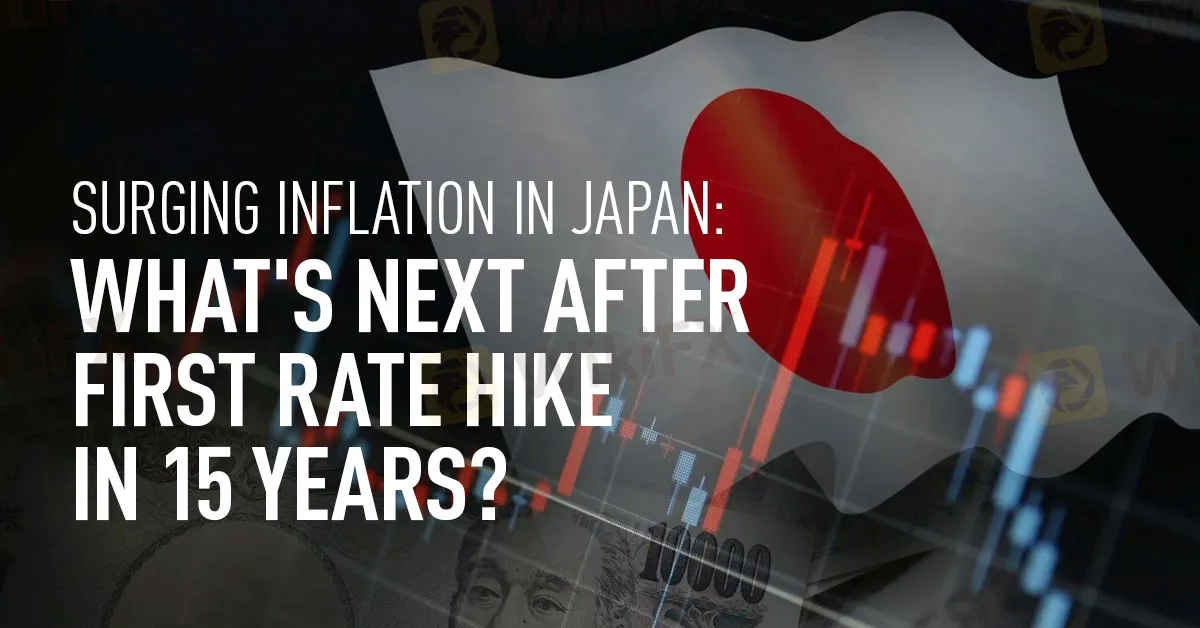简体中文
繁體中文
English
Pусский
日本語
ภาษาไทย
Tiếng Việt
Bahasa Indonesia
Español
हिन्दी
Filippiiniläinen
Français
Deutsch
Português
Türkçe
한국어
العربية
Surging Inflation in Japan: What's Next After First Rate Hike in 15 Years?
Abstract:Consumer inflation in Japan accelerated to its fastest pace in four months, prompting market attention to whether the Bank of Japan might pursue additional interest rate hikes following its first hike since 2007.

Consumer inflation in Japan accelerated to its fastest pace in four months, prompting market attention to whether the Bank of Japan might pursue additional interest rate hikes following its first hike since 2007.
According to the Ministry of Internal Affairs, consumer prices excluding fresh food increased by 2.8% in February compared to a year ago, up from 2% in January, aligning with analysts' forecasts. Similar to previous data for the Tokyo area, much of this growth was attributed to base effects after utility subsidies weighed on prices in 2023.

Following the BOJ's decision to end the negative interest rate, Governor Kazuo Ueda highlighted his close monitoring of service prices, indicating their significance for underlying inflation trends. This observation suggests that changes in service prices, typically occurring at the start of the fiscal year, will be crucial in assessing April's price index.
Ueda explained that the decision to end the negative interest rate was made due to concerns that delaying the move might significantly boost inflationary pressures, potentially necessitating a rapid succession of rate increases. However, he reassured that financial conditions would remain accommodative for the time being, although he acknowledged the possibility of further hikes if inflation risks intensified.
Despite Ueda's remarks, the yen weakened, and Japanese government bond yields fell. Nevertheless, he emphasized the BOJ's readiness to act if upward price risks grew stronger.
Inflation in Japan has proven to be more persistent than initially anticipated, leading the central bank to periodically revise its price growth projections.
Regarding currency intervention, Japanese Finance Minister Shunichi Suzuki stated that it is challenging to speculate on such action when asked about the potential measures to counteract the yen's weakness. This statement came amid expectations of further rate hikes by the Bank of Japan and verbal interventions from Japanese government officials, which provided some support to the yen against the dollar.

Disclaimer:
The views in this article only represent the author's personal views, and do not constitute investment advice on this platform. This platform does not guarantee the accuracy, completeness and timeliness of the information in the article, and will not be liable for any loss caused by the use of or reliance on the information in the article.
Read more

What Impact Does Japan’s Positive Output Gap Have on the Yen?
The Japanese government has announced that, due to a tight labor market, the country’s economic output is expected to return to full capacity in the next fiscal year for the first time in seven years.

WikiFX Review: Is Ultima Markets Legit?
Ultima Markets has played a significant role in the forex trading industry for decades. WikiFX created a comprehensive review to help you better understand this broker. We will analyze its reliability based on specific information, regulations, etc. Let’s get into it.

WikiFX Review: Is FXTRADING.com still reliable?
FXTRADING.com is an online brokerage firm that offers trading services for various financial instruments such as forex, cryptocurrencies, shares, commodities, spot metals, energies, and indices. WikiFX has comprehensively reviewed this broker by analyzing its regulations, specific information, etc. so that you have a deep understanding of this broker.

Financial Educator “Spark Liang” Involved in an Investment Scam?!
A 54-year-old foreign woman lost her life savings of RM175,000 to an online investment scam that promised high returns within a short timeframe. The scam was orchestrated through a Facebook page named "Spark Liang."
WikiFX Broker
Latest News
Russia to Fully Ban Crypto Mining in 10 Regions Starting January 1, 2025
Why is there so much exposure against PrimeX Capital?
Two Californians Indicted for $22 Million Crypto and NFT Fraud
WikiFX Review: Is Ultima Markets Legit?
Colorado Duo Accused of $8M Investment Fraud Scheme
What Impact Does Japan’s Positive Output Gap Have on the Yen?
Malaysia Pioneers Zakat Payments with Cryptocurrencies
FCA's Warning to Brokers: Don't Ignore!
OFX: Is It Good to Go? Broker Review
Financial Educator “Spark Liang” Involved in an Investment Scam?!
Currency Calculator


